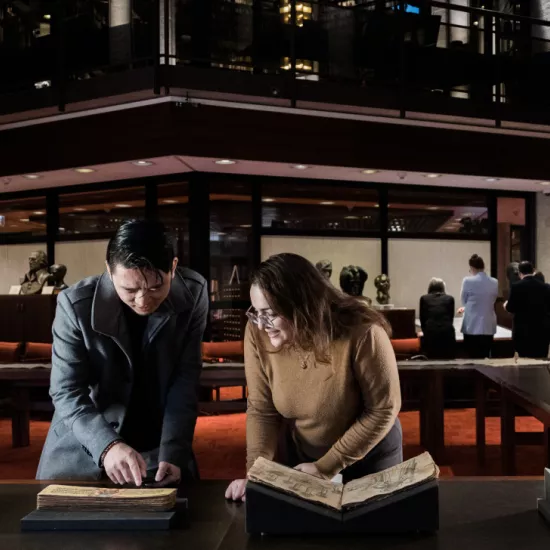Professor documenting 'caravanation' of asylum seekers among UTM researchers to receive Connaught New Researcher Award

Palm Sunday is when Christians reflect on Jesus’ sacrifices and God’s love, but in 2017, that day took on new meaning when a group of 78 Central Americans appealed for compassion as they fled their dangerous homelands.
Hailing from Honduras, Guatemala and El Salvador, they were the first migrants to travel north through Mexico in a group—which later became known as caravans—to seek asylum in the U.S. Their ranks included men, women and children who were escaping state and gang violence, domestic abuse and extreme homophobia and transphobia. As University of Toronto Mississauga political science professor Martha Balaguera notes, this marked a shift in the purpose of migration from economics to safety.
“The caravans that emerged in 2017 created a watershed moment,” recalls Balaguera, who, over several trips, spent more than two years conducting fieldwork in Mexico and San Diego, California, volunteering at migrant shelters and conducting research on their legal rights.” “It was amazing to see how these people who had precarious, hopeless lives began advocating for themselves.”
Balaguera’s experiences researching the plight of these refugee caravans, international asylum laws, and the detention-deportation regime at the U.S.-Mexico border have earned her a U of T Connaught Fund New Researcher Award worth $18,950 (see full list of UTM winners below). The annual award aims to help assistant professors in the first five years of a tenured-stream academic appointment establish a strong research program. To Balaguera, the award feels like recognition of an issue that has only become more timely and important in the last three years.
The Donald Trump administration’s harsh response to these caravans of separating families and detaining participants for lengthy periods in neglectful, even abusive conditions has attracted global attention and pierced the public conscience. The situation has become part of a broader conversation about the flaws of U.S. immigration policies and the rights of displaced people, sparking calls to abolish detention centres, which have become widely perceived as immigrant prisons.
“People are engaging in coordinated efforts to bring down the whole prison industrial complex and unjust institutions in the U.S.,” says Balaguera, who is currently writing a book about her findings and experiences.
A native of Bogotá, Colombia Balaguera grew up amidst the explosive violence of drug cartel conflicts and can relate to those fleeing the region. While studying the phenomenon of the migrant caravans, she has discovered other noteworthy dimensions. She observed how, as more women and children joined men in these groups, their struggle became more vivid, leading to more public support. She discovered the often poor and repressive conditions these migrants experienced in shelters in Mexico. And she has documented how grassroots immigration rights and humanitarian organizations in Mexico and the U.S. have begun working together to help these individuals obtain refugee status.
“The U.S. crackdown on asylum seekers at the border really drives people to desperation,” she says. “But I saw how networks of lawyers and volunteers joined the caravan through various ways, and it became a transnational practice before my eyes.”
Connaught Fund – UTM winners
Martha Balaguera Cuervo, department of political science, Abolition, Legal Accompaniment and the Caravination of Asylum at the US-Mexico Border
Nicole Charles, department of historical studies, Sugar, Slavery and the Gendered Distribution of Diabetes in Barbados
Akash Chattopadhyay, department of management, Business Group Complexity and Firm Valuation: Evidence from Korea
Negin Dahya, Institute of Communication, Culture, Information and Technology, Portraits of Education Change: Redefining Pedagogy & Technology in Refugee Camps
Jim Goldman, department of economics, Government Spending, Corporate Behaviour and Competitiveness
Derek Ng, department of biology, Knowledge Discovery in Molecular Structural Biology: A Grounded Theory Approach
Nicole Novroski, department of anthropology, Highly Informative Genetic Markers for Enhanced Forensic DNA Mixture Deconvolution
Adrien Rannaud, department of language studies, Press and Celebrity Culture in Quebec
Anjuli Raza Kolb, department of English and drama, Commodinyms: Sugar, Water, World Literature
Avery Slater, department of English and drama, Late-Modernist Poetics and the Language of Computation
Anna Thomas, department of English and drama, Forms of Rearrangement
Jue Wang, department of geography, geomatics and environment, Developing a Food Environment Exposure Assessment System Using GPS Tracking and Geotagged Social Media Data
Elizabeth Wijaya, department of visual studies, Luminous Waves: Transregional Visions and Networks in Contemporary Southeast Asian Independent Cinema
Read more:
From hip-hop to healthy soil: 56 U of T researchers receive Connaught New Researcher Award



